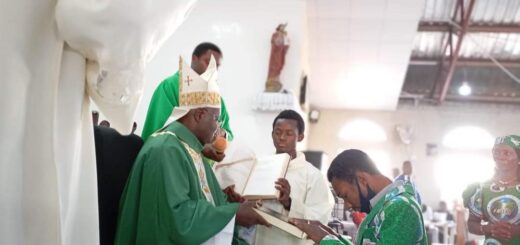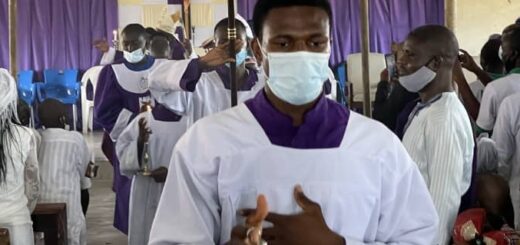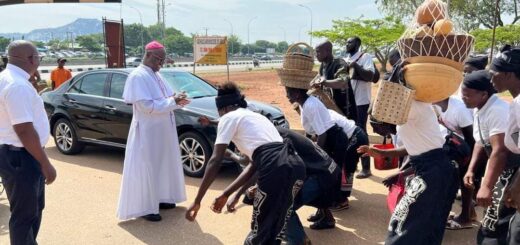A call to nurture the seed of faith planted in us for the Kingdom of God
by ARCH BISHOP · June 16, 2024
Eleventh Sunday in Ordinary Time, Year B, 16th June, 2024, Rome. A reflection by Archbishop I.A.Kaigama.
Reading: Ezekiel 17: 22-24; 2 Corinthians 5:6-10; Mark 4: 26-34
A call to nurture the seed of faith planted in us for the Kingdom of God.
This 11th Sunday of the year found me in Rome, where I came for a workshop. Today, I participated in the Eucharistic celebration in a very quiet and beautiful Church, Church of Santa Maria Mediatrice, belonging to the Order of Friars Minor (OFM). It was however a different experience from what I am used to having every Sunday in our Archdiocese as I move from one place to another. In our pastoral areas and parishes when I visit, most times we have crowded churches, with many people staying outside during the liturgy. Today, even without the big congregation I am used to, and not preaching, I still wish to offer my reflections on what the word of God is inviting us to do and to be.
The Gospel of Mark was written at the time when the early Christians were undergoing great persecutions in the hands of the Romans. These were Christians, who at that time were not strong in the faith, whose faith was still at its early stage and whose faith was, every day, threatened. St Mark wrote to encourage them not to give up. As we gather in worship, let us remember that our faith, even if feeble and humble, has the potential to transform our lives and the lives of others by bearing abundant fruits.
The readings of today, especially the first reading and the Gospel, contain themes of planting, seed, and the need to patiently wait for the seed planted to grow. This waiting, as St. Paul says in today’s second reading, requires some courage, patience, hope and trust in God.
In our first reading, Ezekiel speaks of the Lord planting “a tender shoot” on the “high and lofty mountain” of Israel. This seemingly insignificant twig grows into a mighty cedar, and birds nest in its branches. This cedar represents a messianic figure—a beacon of hope for Israel and for each of us.
About Jesus speaking in parables, the German theologian, Helmut Thielke says that we cannot comprehend the parables of Jesus until we see ourselves in the story. It is only when we do this that we realize that we are the younger (prodigal) son who ran away with his father’s fortune; or the Levite who passed by the beaten man on the road to Jericho; or like today’s mustard seed that has a great potential, in spite of its ordinariness and humble beginning.
We are called today to cooperate in the Kingdom work by planting the seed, the seed of good works (no matter how little or insignificant), and allow God to do the rest. We should do our little and patiently wait for it to bear fruit. We are called not to perform extraordinary things in life, in the Church or in our country but to perform ordinary things in extraordinary ways. Something small can grow into something great. Life is a gradual process of becoming, a series of beginnings. Just keep working at it, and gradually, you become that which you desire. If we only have faith, the size of a mustard seed, our faith will mature and grow, and it will be enough to bring us to eternal life. Let us not just give up. Keep watering it; keep cultivating it. That seed could be in your business, or your office, or even in your marriage or priestly or consecrated life. Whatever it is, keep cultivating, patiently waiting on God to give it growth and increase.
The parable of the mustard seed is a lesson on the presence and power of the divine in the least expected places and situations. God can use lay men or women, clergy, religious or bishops who seem to have little in terms of intelligence, influence or eloquence but scripture says that it is often such people God chooses: the poor to shame the rich; the humble to shame the proud; the weak, to shame the strong (cf. 1 Cor. 1:26-31). God often uses those whom the world considers weak, foolish and insignificant to accomplish His purposes. God comes to us in our littleness. The problem with most of us is that we want to start big.
In Nigeria, I am sure as in many countries too, many people don’t want to start small. This explains the “get-rich-quick syndrome” of our contemporary time, which makes young people especially, to want to go into “Yahoo” business, ritual killing, stealing, prostitution, kidnapping, and many other crimes. God wants each of us to sow seeds of faith, justice, compassion and love in order to make this world a better place to live in. Having done this, we must wait and go on doing everything to reconcile individuals who vehemently disagree; clans or tribes which clash over minor disagreements; herdsmen and farmers who are at one another’s throats; nations which fight bloody wars; political leaders who distance themselves from the poor and needy, etc. We are called to be instruments of hope, peace and reconciliation. I believe that in our respective countries through our honest living, dedicated service to communities and the entire citizens, things can still be better: human rights (including reasonable wages) observed; the vulnerable and innocent children, youth and adults protected, the unwanted will be cared for and the hungry given food. The problem is that our leaders fail to plant the “mustard seed” of integrity, justice, peace and prosperity today, but expect a nation that lives in peace, freedom, unity and progress. The kind of political or socio-economic seeds we sow today determine the fruits we reap tomorrow.
Unfortunately, we live in a world today, that many things appear “impossible.” Why? Because it is a faithless generation (Cf. Mark 9:19). Our trust in God’s handiwork fades, and our spiritual lives often take a back seat. The noise of daily existence drowns out the whisper of divine grace. Like tending a garden, we must cultivate our faith.
While appreciating the remarkable progress made in technology, the Holy Father, Pope Francis does not fail each time to remind us of the Divine and the dangers such remarkable progress carry. During the Group of Seven (G7) industrialized nations summit held June 13–15, 2024, in the southern Italian region of Puglia, he drew attention to the complexity of artificial intelligence as a tool, stressing that human dignity requires that the decisions of artificial intelligence (AI) be under the control of human beings, and artificial intelligence must be used for building a better tomorrow, and aimed at the good of all people.
Dear friends, in the midst of all our struggles and trials, we must commit ourselves to God’s service, deepening our relationship in Him, seeking His presence daily, praying not only when we need something, but also in gratitude and praise.
As we perform our spiritual works, inspired by our different religious traditions (Christianity, Islam, Hinduism, Bhuddism, etc,) we must accompany them with corporal works by showing love, kindness, and mercy to others, becoming a refuge for weary souls, acting in compassion and forgiving those who wrong us, and above all, seeking to deepen our faith in God.
We trust that our leaders will shine as beacons of hope for the despairing, and provide refuge for the desperate and sow healthy seeds of goodwill for a better political today and tomorrow. Jesus has promised: “If you have faith like a grain of mustard seed nothing will be impossible for you” (Mt 17, 20). We all need a faith that is nurtured by the knowledge of God’s active presence and our faithfulness to Him no matter where we find ourselves or with whom we find ourselves.




